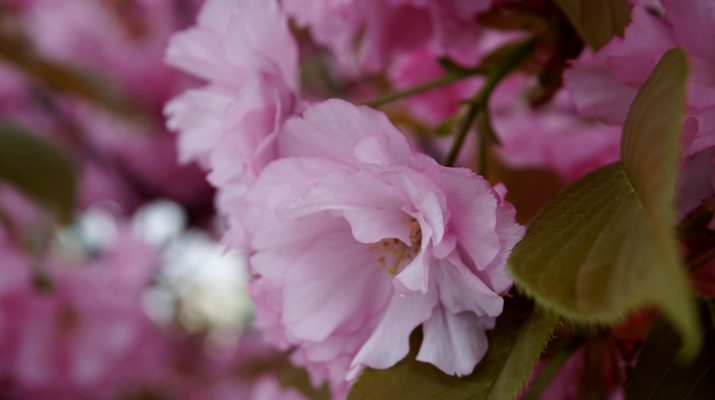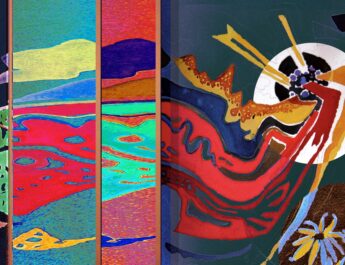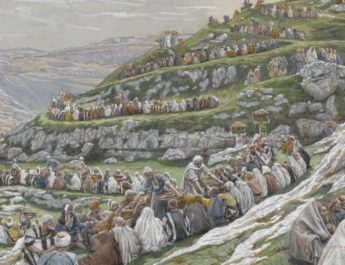Psalm 16
Holy Saturday ABC
A MiktamA of David.B
1 ProtectC me, O God,D for in you I take refuge.E
A “miktam” = miktam. 6x in OT. Perhaps from katham (to carve, mark, stain). This is Miktam, which is some kind of technical term in the Psalms, but its meaning is uncertain. It may mean engraving – a way to refer to a poem.
B “David” = david. From the same as dod (beloved, love, uncle); the root may mean to boil, which is used figuratively to describe love. So, this implies someone you love such as a friend, a lover, or a close family member like an uncle. David’s name likely means something like “beloved one.”
C “protect” = shamar. This is to keep, watch, or preserve. It means to guard something or to protect it as a thorny hedge protects something.
D “God” = el.
E “take refuge” = chasah. This is to take refuge or flee for protection. Figuratively, it means to hope or trust in someone or something.
2 I say to the Lord,F “You are my Lord;G
I have no goodH apart from you.”
3 As for the holy onesI in the land, they are the noble,J
in whom is all my delight.K
F “Lord” = YHVH. From havah (to be, become) or hayah (to come to pass, become, be). This is the name of the God of Israel, the self-existent and eternal one, the tetragrammaton. This pronunciation has been lost to time so “Lord” is generally used in its place.
G “Lord” = Adonai. From adon (lord, master, owner); root means to rule or be sovereign. This is the actual Hebrew word for Lord used (in a different form) of humans and (in the present form) of God. It means someone who is in control.
H “good” = tob. From tob (to be pleasing, to be good). This is good, beautiful, pleasant, agreeable, bountiful, at ease. This word is used for goodness as a concept, a good thing, a good person. This can refer to prosperity and welfare as well as joy, kindness, sweetness, and graciousness. So, this is ethically good, but also enjoyably good.
I “holy ones” = qadosh. From qodesh (set apart and so sacred; God is different from us and so God is holy/set apart; things we dedicate to God’s service are set apart for God and so they, too, are holy); related to qadash (set apart, consecrated, hallowed, sanctified; something or someone set apart for a holy purpose or use – ceremonially or morally clean). This is sacred or holy in a ritual or moral sense. As a noun, it refers to a holy one (like a saint or angel), a holy place (the sanctuary), or God (the Holy One).
J “noble” = addir. From adar (wide, glorious, honorable, great, magnificent). This is majestic, excellent, mighty, powerful, or noble.
K “delight” = chephets. From chaphets (properly, inclined towards or bending to; figuratively, to desire, delight in, or be pleased with). This is a delight, care, or pleasure. It is what you desire or what is acceptable. It can also be used concretely for a precious thing or something that one is thinking about.
4 Those who chooseL another god multiplyM their sorrows;N
L “choose” = mahar. This is being liquid, which implies flowing. So, this word implies hurrying forward, whether in a positive or negative sense.
M “multiply” = rabah. This is increasing in any aspect whether quantity, authority, size, quality, greatness, etc.
N “sorrows” = atstsebeth. 5x in OT. From atsab (to hurt, grieve, displease; to carve, make, worry). This is an injury, sorrow, trouble. It can also refer to an idol.
their drink offeringsO of bloodP I will not pour outQ
or takeR their namesS upon my lips.
O “drink offerings” = nesek. Related to “pour out” in v4. From nasak (see note P below). This is a drink offering or a molten image.
P “blood” = dam. Perhaps from damam (to cease, be or become mute, silent, still, cut off, hold peace, be astonished, die). This is blood, bloodshed, bloodguilt, lifeblood, and death. It is used for people and animals. More often blood from a wound or the blood of the innocent. Used figuratively for violence or for wine. Closely tied to life and death.
Q “pour out” = nasak. This is to cover, pour out, offer like a libation, or to cast like one casts metal. By analogy, it can mean anointing a king.
R “take” = nasa. This to lift in a broad sense, literally and figuratively. So it could be to carry, take, or arise. It could also be bring forth, advance, accept.
S “names” = shem. May be from sum (to put, place, set). This is name, fame, renown. A name was thought to indicate something essential about a person – something about their individuality. So, this word can also mean honor, authority, or character.
5 The Lord is my chosenT portionU and my cup;
you holdV my lot.W
T “chosen” = cheleq. From chalaq (to be smooth in a figurative sense; can refer to the stones that were part of casting lots – hence, apportion, share, distribute; figuratively, it can also mean to flatter). This is a division, lot, inheritance, legacy, or portion. It can also refer to a smooth tongue.
U “portion” = manah. 14x in OT. From manah (to weigh out, reckon, count, number, set, tell. By implication, it is allotting or providing something officially). This is a part or portion. It is something that is weighed out so it can be used specifically for a ration or portion of food. It can also mean a lot as in casting lots.
V “hold” = tamak. This is to sustain, support, maintain, grasp. Figuratively, it can be to help or uphold.
W “lot” = goral. Root may mean to be rough like a stone. A lot was probably a small pebble used to determine one’s portion or what one should do (the will of a god or one’s destiny).
6 The boundary linesX have fallen for me in pleasantY places;
I have a goodlyZ heritage.AA
X “lines” = chebel. From chabal (to bind, pledge, or wind tight; figuratively, can refer to perverting or destroying something; can also be used of writhing in pain, particularly in reference to childbirth). This is a band, rope, measuring line, noose. It can be a company, territory, or country. It can also refer to a throe of labor or ruin.
Y “pleasant” = na’iym. 13x in OT. From na’em (to be pleasant or lovely; to surpass in beauty; to be delightful in a literal or figurative sense). This is sweet, lovely, or delightful.
Z “goodly” = shaphar. 1x in OT. Properly, to glisten. Figuratively, this is lovely, fair, plenty, sufficiency.
AA “heritage” = nachalah. Perhaps from nachal (to inherit, occupy, distribute, take as heritage). This is properly something that was inherited. It can mean occupancy generally or, more particularly, an heirloom or an estate. This can be an inheritance, gift, possession, or portion.
7 I blessBB the Lord who gives me counsel;CC
in the nightDD also my heartEE instructsFF me.
BB “bless” = barak. This is to kneel, to bless. It is blessing God as part of worship and adoration or blessing humans to help them. It can be used as a euphemism to say curse God.
CC “gives…counsel” = yaats. This is to advise, counsel, consult, decide, plan, purpose, or determine. It can also have a negative sense of conspire or devise.
DD “night” = layil. Properly, this refers to light twisting away. It is used for night or midnight. Figuratively, this can mean adversity.
EE “heart” = kilyah. Perhaps from keli (something that was prepared – any implement, utensil, article, vessel, weapon, or instrument; also includes jewels, weapons, bags, carriages, and furniture); from kalah (to end, be finished, complete, prepare, consume, spent, or completely destroyed). This is inward parts, such as kidney or heart. It can also be inmost being as feelings, mind, or within.
FF “instructs” = yasar. This is to discipline, correct, train, teach, punish. Literally, it is disciplining with blows, but figuratively using words.
8 I keepGG the Lord alwaysHH before me;
because he is at my right hand,II I shall not be moved.JJ
GG “keep” = shavah. This is to equalize, resemble, agree with, compare, adjust, compose, place, or yield.
HH “always” = tamid. May come from a word that means to stretch. This word means an indefinite period of time. So, it could be regular or daily. It could also be constantly, continually, always, or perpetually.
II “right hand” = yamin. May be from yamam (to go or choose the right, use the right hand; to be physically fit or firm). This can mean right hand, right side, or south. Since most people are right-handed, the metaphorical usage of this word presumes that the right hand is stronger and more agile. Thus, it is the instrument of power and action.
JJ “be moved” = mot. This is to shake, slip, falter, stagger, move, fall, give way, waver, be carried.
9 Therefore my heartKK is glad,LL and my soulMM rejoices;NN
my bodyOO also restsPP secure.QQ
KK “heart” = leb. May be related to labab (to encourage; properly, to be encased as with fat; used in a good sense, this means to transport someone with love; used in a bad sense, it can mean to dull one’s senses). This is the heart, courage, one’s inner self, the mind, or the will. Heart is only used in a figurative sense in the Old and New Testaments.
LL “is glad” = samach. This is to rejoice or be glad. Properly, it is to brighten up in a literal or figurative sense.
MM “soul” = kabod. From kabad (to be heavy, weighty, burdensome). This is weighty. Figuratively, glorious, abundant, riches, honor, splendor – a reference to one’s reputation or character. This word is often used to describe God and God’s presence.
NN “rejoices” = gil. Properly, this is twirling around because of a strong feeling whether of rejoicing or from fear. This can be rejoice, be glad or joyful, or to cry.
OO “body” = basar. From basar (being a messenger, publish, carry preach; properly, this is being fresh, rosy or cheerful as one bearing news). This is flesh, the body, fat, skin, self, nakedness, humankind, or kin. It can also refer to private parts.
PP “rests” = shakan. This is to settle down in the sense of residing somewhere or staying there permanently. It can mean abide or continue. “Mishkan,” taken from this verb, is the Hebrew word for the Tabernacle (as a place where God abided).
QQ “secure” = betach. From batach (to hide for refuge, be secure or sure; figuratively, it refers to trust, being confident, or hoping). This is a place of refuge. So, abstractly, it can be confidence, security, hope, trust, or assurance.
10 For you do not give meRR upSS to Sheol,TT
or let your faithful oneUU see the Pit.VV
RR “me” = nephesh. Related to naphash (to refresh or be refreshed). This is soul, self, person, emotion. It is a breathing creature. Can also refer to appetites and desires.
SS “give…up” = azab. To loosen, relinquish, permit, forsake, fail, leave destitute.
TT “Sheol” = sheol. Perhaps from sha’al (to ask, request). This is the place where the dead go, the grace, the underworld.
UU “faithful one” = chasid. From chasad (being good, kind, merciful; may mean bowing one’s neck as is done in the presence of an equal for courtesy’s sake; so, if one in a superior position is treating you like an equal, that is what is captured here). This is faithful, kind, pious, merciful, or gracious. It can also refer to godly or pious people. This is where Chasidic Jews take their name from.
VV “pit” = shachath. From shuach (to bow or sink down in a literal or figurative sense, humble). This is ditch, trap, grave, or hole. Figuratively, it could be destruction or corruption.
11 You showWW me the pathXX of life.YY
In your presence there is fullnessZZ of joy;AAA
in your right hand are pleasuresBBB forevermore.CCC
WW “show” = yada. This is to know, acknowledge, advise, answer, be aware, be acquainted with. Properly, this is to figure something out by seeing. It includes ideas of observation, recognition, and care about something. It can be used causatively for instruction, designation, and punishment.
XX “path” = orach. From arach (to go, travel, wander). This is a road that is widely used, highway, caravan, traveler, troop.
YY “life” = chay. From chayah (to live or keep alive literally or figuratively). This is alive, living, lifetime. It can also be used to describe someone’s age. It can refer to animals, plants, water, or a company or congregation of people. It is life in a very broad sense.
ZZ “fullness” = soba. 8x in OT. From saba (to be satisfied or full in a literal or figurative sense; to have plenty of). This is abundance, fullness, satisfaction. Properly, it is being sated – having enough food. Figuratively, it is fullness of joy.
AAA “joy” = simchah. Related to “is glad” in v9. From samach (see note LL above). This is joy, rejoicing, pleasure, or glee.
BBB “pleasures” = na’iym. Same as “pleasant” in v6. See note Y above.
CCC “forevermore” = netsach. From natsach (something that glitters from a distance or stands out, excels, has status/standing; also to be permanent or enduring). This is properly a goal or destination as the bright focus to which one journeys. It can be splendor, truthfulness, or confidence. Most often, it refers to everlastingness, always, continually.
Image credit: “Japanese Cherry Blossom” by Silberbeeren.




